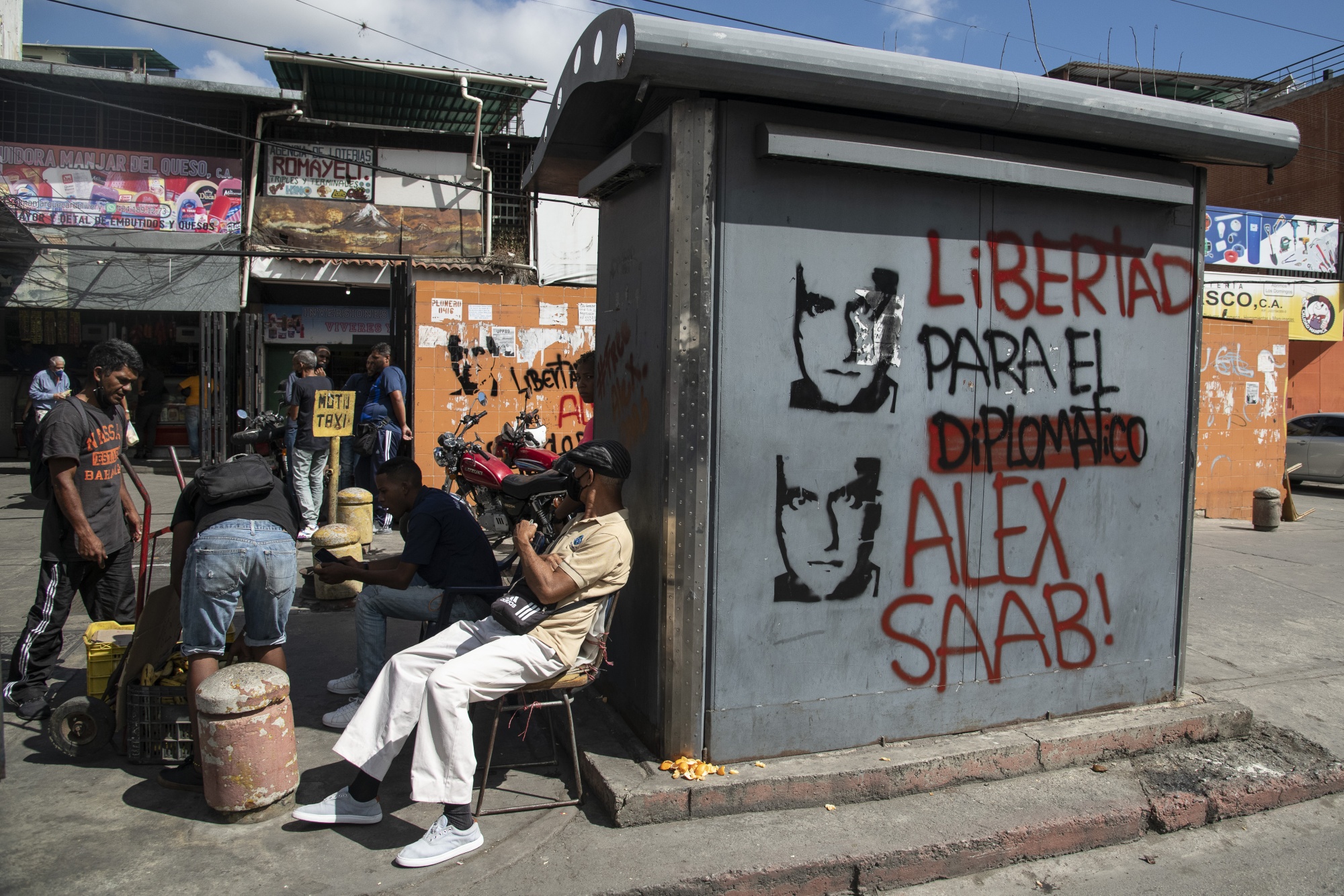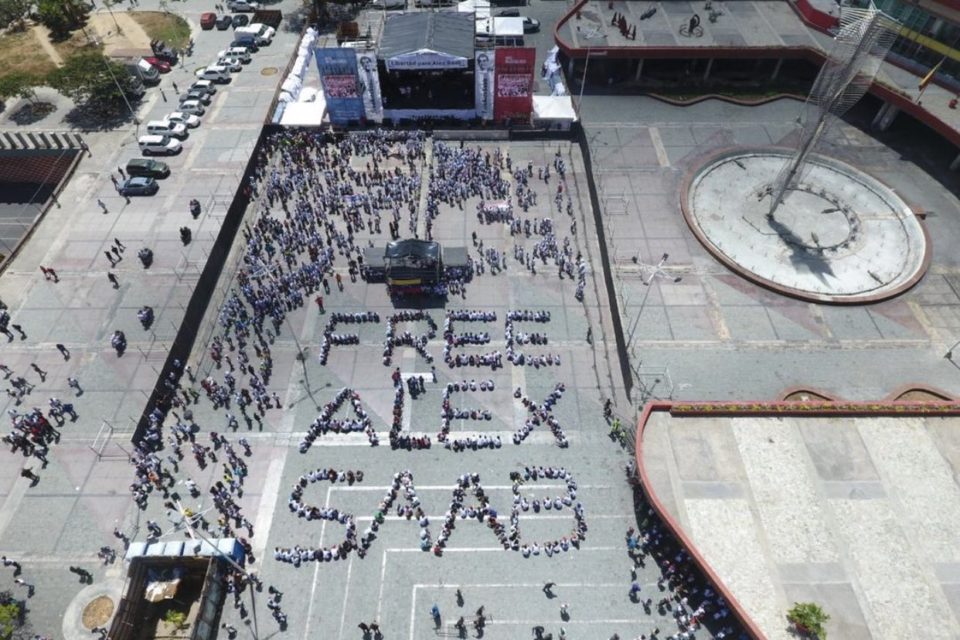Sanctions: The New Main Trope in the Chavista Narrative
As populist parties usually do, chavismo has always resorted to victimization as casus belli behind collective vengeance. Now the sanctions are at the center of a patriotic resistance story


Photo: Al Chavismo
This weekend, in Caracas, at Diego Ibarra Square (close to the infamous electoral headquarters), the Maduro regime threw a strange party with slogans in English made to inflame the hearts of tankies that would otherwise be watching Telesur at that hour. People weren’t dressed in red, the color of the Bolivarian Revolution, but in white, the color for peace, reconciliation, and justice.
They demanded the release of Alex Saab from prison, a man who’s described by the regime as a Venezuelan diplomat who’s been working hard to find some food in the world to satisfy the hunger of millions of Venezuelans. Saab isn’t Venezuelan (he was born in Colombia), and he’s not a diplomat, even though the regime just appointed him as their ambassador to the African Union. Saab is a businessman, if we can use that term to define someone who built a global network of dummy corporations and offshore accounts, around the source of his fortune: a privileged relationship with the Maduro regime.
Caracas Chronicles readers must be familiar with the real story of Alex Saab: he’s the head of a huge scheme of imports to Venezuela (the most visible being the CLAP boxes of subsidized food that have included fake milk, and the CLAP stores) and of exports from Venezuela (sanctioned oil, among other things). He’s the center of the secret network of contacts, businesses, accounts and schemes to avoid sanctions and manage the fortune of the Maduro regime elite, very likely including Maduro’s personal wealth.
Since he was detained during a stop in the African archipelago of Cape Verde last year, wanted by the United States for several charges, the Maduro regime has mobilized an important part of its diminished resources to find him the best defense team (led by the Spanish lawyer who prosecuted Augusto Pinochet) and grant him Venezuelan citizenship and diplomatic immunity. So far, Saab hasn’t been extradited to the U.S., an outcome the chavista regime is desperate to avoid: in an American jail, Saab would be incapable of managing his network, and he would also become a treasure chest of information about bank accounts and businesses of key importance for the Bolivarian nomenklatura.
It’s easy to understand the regime’s true intentions, keeping Saab away from an orange prison outfit and trying to make a deal with chavismo’s worst enemy. What’s harder to grasp is why the regime wants to turn a former secret asset into a national hero. This weekend’s Free Alex Saab event came after weeks of graffiti and stencils in the streets, with that same message in Spanish.

“Freedom for the diplomat, Alex Saab!”
Photo: Bloomberg
Alex Saab became a star of the regime’s propaganda because he’s not a secret anymore, thanks to our friends from ArmandoInfo, with the regime thinking he could be a face and a name for the emerging narrative of the nation under siege. The sanctions (which work as an excuse for persecuting dissidents) explain everything, even the myriad of problems that the regime itself caused long before those very sanctions were issued. According to this narrative, everything would be just fine if the devilish “American Empire” hadn’t issued those sanctions to squeeze 30 million Venezuelans and unseat the socialist revolution.
If the reader is thinking of Cuba, he’s right: this is exactly the propaganda model applied with the U.S. embargo since the 1960s in the Castro regime propaganda. Maduro just has to adapt it to the Venezuelan context. Even chavistas are calling the sanctions a “blockade”, just as Cubans do, as if the sanctions were enforced by an armada aiming guns at our ports. Many of the regime’s allies face the risk of sanctions, too, while enjoying the same propaganda opportunity: Iran, Turkey, and Russia.
So expect more Saab victimization (he’s saying from Cabo Verde, to Russian and Venezuelan official media, that he has been tortured), as the sanctions are the center of what we have for politics this year. And remember how this show started with the serious, brave work of a group of investigative journalists who had to leave the country because of Saab’s power.

“So expect more Saab victimization (he’s saying from Cabo Verde, to Russian and Venezuelan official media, that he has been tortured), as the sanctions are the center of what we have for politics this year.”
Photo: Al Chavismo
Sandra Caula interviewed the director editor of ArmandoInfo, Ewald Scharfenberg, for Cinco8, our sister site in Spanish. He goes at length on how tedious and hard it is to develop the investigations that revealed Saab’s role in the chavista corruption, along with the Panama Papers and the reach of Odebrecht amid chavista and opposition candidates. Elaborating on the role that this kind of journalism has in today’s Venezuela, he states:
“I often wonder, and we wonder at ArmandoInfo, about the line dividing the coverage of a story that’s relevant to society (like the one we’ve done about Alex Saab) from a moralistic crusade, or a personal quarrel. Our job is to reveal and connect evidence, to reach convictions on facts, not to condemn or militate in causes. What we do is the press’s source of legitimacy: the stewardship and decrying functions that belong to society but that society cannot do. Tocqueville wrote that he appreciated the press more because of the bad things the press prevents, than for the good things the press has. Ours is an unpleasant job. Those who want ‘useful’ or ‘celebratory’ content can go to the yellow pages or the corporate brochures; we must look at society’s defects to prevent their multiplication. A vigorous, free journalism that scrutinizes the legitimate and factic powers is part of the institutional frame that society needs to catch the signs of corruption that will always exist. If we don’t do that, we’re just another piece of the establishment. Distance with power, denounces and exposé are the heart of journalistic work.”
Read our previous pieces on ArmandoInfo and Alex Saab here.
Caracas Chronicles is 100% reader-supported.
We’ve been able to hang on for 22 years in one of the craziest media landscapes in the world. We’ve seen different media outlets in Venezuela (and abroad) closing shop, something we’re looking to avoid at all costs. Your collaboration goes a long way in helping us weather the storm.
Donate




